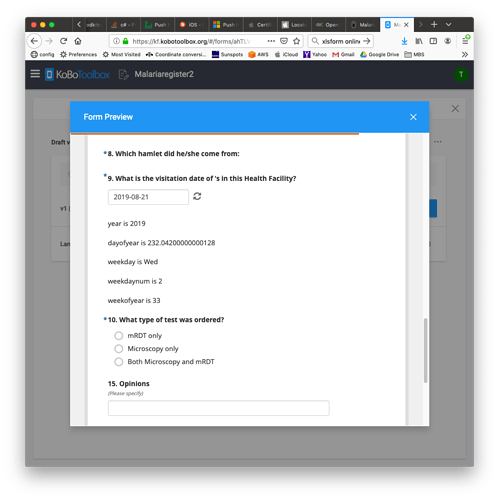This resulted from a recent Forum question posted by @Godsway_Sackey, asking how to determine the week number of a given date; that is, in which week of the year (eg 1..52) a date occurs. Presently, there is no build-in ODK function to computes this, nor does the existing format-date() ODK function have a option for displaying the week number. However, it appeared that ODK possessed all the necessary pieces of the puzzle to solve the problem... It was a fun and interesting exercise, so I thought I'd share with the wider community. Plus it gives you an idea of what you can actually accomplish in ODK forms with a bit of creative thinking! ![]()
To restate the problem as originally posed:
"get a week number automatically when I select date"
per ISO8601, weeks start on a Monday, where the first Monday of the year determines week #1 [these are important and will dictate the precise result].
Determining the week of year is certainly no new problem in computer science, and there are a lot of existing tools which already perform this calculation. I chose to look at the standard Linux/C function strftime() for the formula:
Description
The C library function size_t strftime(char *str, size_t maxsize, const char *format, const struct tm *timeptr) formats the time represented in the structure timeptr according to the formatting rules defined in format and stored into str.
Declaration
Following is the declaration for strftime() function.
size_t strftime(char *str, size_t maxsize, const char *format, const struct tm *timeptr)
...
%W Week number with the first Monday as the first day of week one (00-53)
The specific formula that strftime() uses to compute %W can be found in the source code for strftime.c:
case 'W':
if (!_conv((t->tm_yday + 7
- (t->tm_wday ? (t->tm_wday - 1) : 6))
/ 7, 2, '0'))
return(0);
continue;
So our desired formula is: (t->tm_yday + 7 - (t->tm_wday ? (t->tm_wday - 1) : 6)) / 7
We can looking at the header file time.h to find out what these variables mean:
struct tm {
int tm_sec; /* seconds after the minute [0-60] */
int tm_min; /* minutes after the hour [0-59] */
int tm_hour; /* hours since midnight [0-23] */
int tm_mday; /* day of the month [1-31] */
int tm_mon; /* months since January [0-11] */
int tm_year; /* years since 1900 */
int tm_wday; /* days since Sunday [0-6] */
int tm_yday; /* days since January 1 [0-365] */
int tm_isdst; /* Daylight Savings Time flag */
long tm_gmtoff; /* offset from CUT in seconds */
char *tm_zone; /* timezone abbreviation */
};
To summarize, if we can get the day-of-year (tm_yday) and day-of-week (tm_wday) we can plug it into this formula to give us the week-of-year!
Going back to ODK-land... there isn't an existing function to calculate the day-of-year; however, we can calculate this by subtracting from the numeric representation of our target date, obtained using ODK's decimal-date-time(), the numeric representation of Jan 1 of the same year, which will give us the number of days between; hey presto day-of-year!
So the next problem is how to generate a date for Jan 1 of the same year... This can be accomplished by extracting just the year from our target date, using ODK's format-date() with a format of '%Y'. To this we just need to add "-01-01" for Jan 1. That is:
year = format-date(${date},"%Y")
dayofyear = decimal-date-time(${date}) - decimal-date-time(concat(${year}, "-01-01"))
Next, we need to get the day-of-week... ODK's format-date() can also be used for this, using the '%a' format, but unfortunately it gives us the weekday text abbreviation ("Mon", "Tue", ...) whereas we need the weekday number (0,1,2,...) for our formula. Rather than write a long messy nested if() expression to do this conversion, instead I made a simple lookup table using a select_one question's label-value pairs.
label value
-----+-----
0 Mon
1 Tue
2 Wed
3 Thu
4 Fri
5 Sat
6 Sun
[to prevent this select_one question from actually appearing in the form, you can just set its relevant="false()"]
Once I have the weekday text obtained from format-date() I can lookup the corresponding weekday number with a single jr:choice-name() call. That is:
weekday = format-date(${date},"%a")
weekdaynum = jr:choice-name(${weekday},'${lookuptable}')
where ${lookuptable} is a reference to my hidden select_one question.
And now, finally, we have all the data we need to plug into our week formula!!!
weekofyear = int((${dayofyear} + 7 - ${weekdaynum}) div 7)
(the original C formula does integer division, which we mimic in ODK by dropping the decimal from the result using the int() function)
There you have it. Here's a form which implements all the steps of the calculation - have a play!
weekyear.xls (20.5 KB)
weekyear.xml (2.9 KB)
[bonus question: who can tell me why I labelled Monday as 0 in my select_one, and not Sunday... ![]() ]
]
